Peter MALONE
Saturday, 18 September 2021 19:23
To Protect and Serve
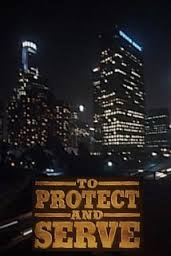
TO PROTECT AND SERVE
US, 1992, 88 minutes, Colour.
C. Thomas Howell, Lezlie Deane, Richard Romanus, Joe Cortese.
Directed by Eric Weston.
To Protect and Serve is expected material: a focus on a police officer whose father has died in active service, police corruption, a vigilante seeming to be killing off corrupt police - with the final revelation that it is the corrupt captain who is murdering his colleagues.
C. Thomas Howell is the veteran of so many of this kind of made-for-Home Box Office or video thrillers. Richard Romanus, a veteran of many dramas, gives an interesting performance as the captain until he is revealed as the dastardly villain. In fact, apart from the suspicion that the young hero is the killer, there is nobody else in the screenplay who fills the bill as the villain to be revealed, except the captain. Much of the film is set at night, in alleyways, at wharves, in clubs, as the corrupt police boast about their lives and then are murdered.
1. The popularity of this kind of investigation of police corruption? Low-key drama for television and video audiences?
2. The Los Angeles settings, the precincts, apartments, alleyways, wharves, clubs, precincts? Musical score?
3. The title and its focus on police work and service? The irony with the criticism of corrupt police and corruption being perpetuated? The need for investigation, for justice?
4. The focus on Egan, the initial crime, the police bashing the suspect, his seeming to turn a blind eye? Under investigation? His having reported the corruption, his meeting Internal Affairs in secret? His relationship with Harriet, her being appointed as his partner? The retrospect that the captain was putting her with him to put Egan off his scent? His discussions with the various police, the investigations, the murders? Kozinsky and his boasts? Beverley and her disappearing, his trying to track her down? The relationship with Harriet, their discussions, Harriet suspicious of him?
5. The portrait of the corrupt police, their brutality, Kozinsky and his rationale? The policemen in the car with the drug dealer, the prostitute, being shot? The policemen in the car park, Kozinsky's death? The officer with the diary and his being murdered? The cumulative effect, Egan getting the diary, reading about the captain, his father's death, the confrontation with the captain, the captain boasting about killing his father? The shootout?
6. Internal Affairs, investigation, the pressure on Egan? Harriet and her suspicions, the phone calls, setting him up by disguising herself as Beverley? Her saving him from the attack of the captain?
7. Police routines, the film's exploration of the possibilities of corruption, the effect on police, on their work? The young hero and the revelation of the truth?
Published in Movie Reviews
Published in
Movie Reviews
Tagged under
Saturday, 18 September 2021 19:23
Talent for Loving, A
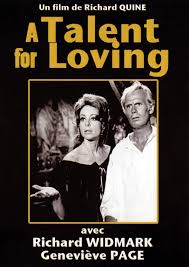
A TALENT FOR LOVING
US, 1969, 101 minutes, Colour.
Richard Widmark, Cesar Romero, Genevieve Page, Topol.
Directed by Richard Quine.
A Talent for Loving is a little seen feature directed by Richard Quine (director of many comedies and musicals, especially with Jack Lemmon, Bell Book and Candle, The Notorious Landlady, How To Murder Your Wife). The film is based on a novel by celebrated American author Richard Condon (The Manchurian Candidate).
The film is a zany look at the Wild West and its traditions. However, while the style is amusing, it doesn't quite jell. The film did not gain much commercial release but went straight to television. Richard Widmark seems to enjoy himself moderately in the central role, comedy not entirely his style. Topol, prior to Fiddler on the Roof, is a raucous Mexican General coward. Genevieve Page is attractive as the leading lady but is not allowed much prominence. Cesar Romero, on the other hand, has a very good role as a Mexican Grandee. There is a lively youthful supporting cast.
The film pokes fun at the conventions of the West, pokes fun at sex comedies and uses all kinds of farcical cinema devices to achieve its purpose. Entertaining while it is on the screen, but not as memorable as western spoofs like Butch Cassidy and the Sundance Kid or Cat Ballou.
1. An enjoyable film? Its not being a commercial success? Why not?
2. The work of Richard Condon? Adaptation of his novel for the screen? The comic style, farce and spoof? Verbal wit, visual? The cinema devices, the credits sequence and the captions, the playing against type of Mexicans, cowboys, Indians? The romantic touch at the end with the horsemen forming a heart?
3. Audience expectations of westerns? The 19th century? The location photography, grand style? Costumes and the comic touches with the Mexicans wearing Italian opera costumes that they robbed? The credits and the comic captions? The stylised conventions? Squalor and wealth? The open plains and cattle? Trains? The jaunty musical score? pacing and editing?
4. The title and the curse ? the joke about the Aztec curse, sexual passion, the frantic comedy about the curse? Done Jose and his possessing it, his feminine entourage and servants? Maria and her growing up with it, the marriage to Major Patten, her running off? Eveline and the secrecy? Her knowledge of the curse and her chasing Jim and Florita? The final joke about General Molina and his family? The devices for the sex comedy? visual, verbal?
5. Richard Widmark as Major Patten, the gambler, tough, his name and the descriptive Christian names to give some pretensions? His winning, the clashes with the General continuing throughout the decades? His taking up his claim, the visit to Don Jose, overwhelmed by the affluence, charmed by Maria, the gambling and winning Maria's hand? The curse? The marriage and Major's tensions? His daughter and his concern? The death of Don Jose? His wife running off? Don Patrizio and his search for his daughter? Taking over his son and friend and bringing the boys up? The change of situation,, Delphine and her leaving, his rescuing her from the General? The happy marriage, Evelina's return? The build-up to the final confrontation with the General, the competition for the boys to win Evelina's hand? Dinner with the General, the train, the siege, the happy ending?
6. Cesar Romero and Don Jose, the elegant Grandee, his style the curse, the women, love for Delphine? His hiding the guns? His death?
7. Maria and Evelina? The Hispanic passionate style? Comparisons with the other women, Marilyn and her primness, knowledge about cattle, wearing spectacles yet chasing and winning her man? Florita and her love for her father, infatuated with Benito? The women as glamorous?
8. Benito and Jim, their work on the farm, the attraction towards Marilyn and Florita, Evelina and their being caught by Major in the bedroom, the competition in the water and her rescuing them, the race, each of them going off to his own lady love?
9. Topol's General, bluster, the coward, corny humour, gambling, bad shot, the various attacks, cowardice? The antagonism towards Major Patten? Wanting Don Jose's guns? His self-importance and aims to rule Mexico? His costumes from the Italian opera company? Keeping Martinelli as his secretary? The operatic style? The growing old, the confrontation with the Major, drinks? The marrying off of his daughter? The siege of the train, the men's retreat, caught in their underwear? The giving in? Happy ending?
10. The jokes about the Indian tribes, capturing white wives, the wife being fat and a shrew? The Indian chief and his opting out? Rescuing the whites from the Mexicans?
11. Derek Nimmo's Moodie, the English travelling salesman, the seeming buffoon, taking advantage of the situation, infatuation with Evelina, his proposal of the race ~ and his winning Evelina?
12. The build-up to the confrontations, the comic siege?
13. An enjoyable piece of Americana poking fun at western traditions, Mexico, the United States?
Published in Movie Reviews
Published in
Movie Reviews
Tagged under
Saturday, 18 September 2021 19:23
Taking of Pelham 1 2 3, The
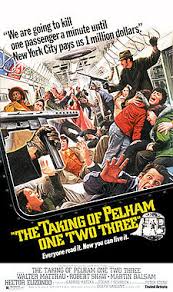
THE TAKING OF PELHAM 123
US, 1974, 104 minutes, Colour.
Walter Matthau, Robert Shaw, Martin Balsam, Tony Roberts, Hector Elizondo.
Directed by Joseph Sargent.
The Taking of Pelham 123 is recommended action excitement. After planes, ships and skyscrapers, the subway train. Too close to daily travelling to make us detached observers of a hijacking, the train contains ordinary people as hostages and, while one can't imagine it happening anywhere but in New York, it has the flavour of realism. Blending comedy dialogue with split-second timing (cinema time corresponding to plot time) and a narrative that continually gathers momentum like the speeding runaway train, this film succeeds in what it set out to do, entertain excitingly. Walter Matthau is excellent as the wise-cracking policeman, Robert Shaw icy as the criminal mastermind. Excellent supporting characterisations and a vividly real New York City.
1. A successful robbery film? In the tradition of the police films of the 70s? The atmosphere of the disaster trend of the times? How well did this film blend in its screenplay, production, visual impact and suspense the various strands of these genres? Interesting and exciting entertainment? The nature of its appeal, fantasy and realism?
2. The importance of the New York atmosphere and environment? The presentation of the subway and the railway system ? how interesting and informative the explanations, Gerber and his tour with the Japanese visitors and the explanation to the audience? The world of criminals in New York, especially in the subway? The city itself and its people, the streets and the buildings? The police and their trying to cope with the situation? The Mayor and public popularity and the ransom money? The role of authority in New York coping with this disaster? The ordinary people of New York, especially those in the train with the various types represented? Audience identification with the people on the train?
3. The strengths of Walter Matthau and Robert Shaw in their roles? The interaction of the two and the contrast in character studies? The screenplay and its drawing vividly of the characters and their involvement in the plot? The dramatics and timing ? the sense of real time combining with cinema time? The suspense and the human situation?
4. Comment on the film's techniques for generating suspense, editing and pacing, the use of real and cinema time, the speeding trains, the urgency and the way this was expressed in the language? The speeding car for instance through the New York streets and its accident?
5. The importance of the introduction to the rail system, Gerber at work, the various personnel involved and their abilities in guiding the trains and their timetables? The humorous ironic touch and the Japanese speaking English? How well did this prepare the audience for the crises, showing the men capable of handling the situation? The computer, the lights, the means of communication, the supplying of information?
6. Audience identification with trains and train passengers? The ordinary train on its route, the takeover and the violence of the melodrama, the illustration of the brutality of the men? Mr. Green and his associates? The anonymity of the names and yet the personalities emerging? The remaining anonymous for police purposes? The motives of these men, their violent backgrounds, the violence they exhibited? Attitudes towards one another, the killings, the hostages and their terror, the demands and the calculations that they made?
7. The portrait of the driver and his handling of the situation, the people who were allowed to go and their walking out from the darkness of the subway tunnel, the hostages remaining and their fear, the guards and their attempts to warn and their deaths? The authentic presentation of what could easily happen?
8. The film spent a lot of time on the interplay between Gerber and Mr. Green. The importance of their verbal exchanges, the psychological counterpointing, time, the wit and sparkle of their cracks? The importance of Gerber having time to think out the issues? How did the screenplay invite the audience to work out with it what had to be done?
9. The interlude with the Mayor and his assistant, the publicity, votes. The irony of the Mayor's behaviour, the advice of his wife, the calculations of his assistant, his giving help, the calculations and the phoniness of his public presentation? Political comment about the value of human lives, careers and reputations?
10. The dramatics with the money, the cars through the city, the crash and the speeding? The further moves and deaths?
11. The build-up of suspense in the arranging of the tracks to be cleared, the calculation of the way that the train ran and would stop or not stop?
12. The importance of Gerber's hunch and his going to the train, the final encounter with Mr. Blue and his decision to electrocute himself? The background explanation of his personality, mercenary, his motives, his death?
13. The escape of the associates? Their place in the robbery?
14. The search for Mr. Green, the sleazy background of his living place, Gerber finding him and the irony of the sneezing? (And the suspense in trying to track down the possible candidates for the identity of Mr. Green?)
15. Comment on the commercial skills and filmmaking brought to these ingredients for audience response to this kind of disaster robbery.
Published in Movie Reviews
Published in
Movie Reviews
Tagged under
Saturday, 18 September 2021 19:23
Take This Job and Shove It
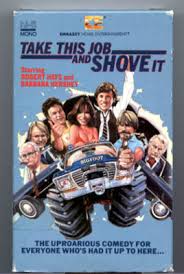
TAKE THIS JOB AND SHOVE IT
US, 1981, 95 minutes, Colour.
Robert Hays, Barbara Hershey, David Keith, Art Carney, Eddie Albert.
Directed by Gus Trikonis.
Take This Job and Shove It is a particularly American social comedy. It is based on a hit song by David Allan Coe, sung by Johnny Paycheck. The plot focuses on the confrontation between big business management and small local Mid-American? industry. It is particularly relevant to the social situations and recession of the late 170s?early 180s. It has a relevance for many industrialised countries throughout the world, and may indicate something of the atmosphere of recession in the early '80s. The film is directed by Gus Trikonis, whose early films were made for New World Pictures under the aegis of Roger Corman. He has a particularly talented cast for the film, including Robert Hayes (Flying High), Art Carney and Eddie Albert, Barbara Hershey as the heroine and David Keith (The Rose, Back Roads, Officer and a Gentleman). The film has a blend of the serious and the comic and is saying something, at a popular level, about capitalism, industry, the individual against the organisation.
1. An entertaining American comedy drama? The social focus? The persuasiveness and authenticity of the issues? Characters? Confrontation and resolution?
2. Colour photography, the contrast between the atmosphere of California and Dubuque, Iowa? Big business offices and local industry? The atmosphere of the small American city? The song from which the title comes, the musical score?
3. The title of the song and its confrontational tone? The skill of the screenplay in building a plot on the attitude of the song?
4. The credibility of the plot? The establishing of the West Coast style of big business? Corporate executives and their affluent symbols? The contrast with Middle America and its attempt to survive in economically difficult times? The young man returning to his home town and being confronted by his friends, girlfriend? The older generation in the town? Support for change, opposition? His having to face questions of integrity and loyalty?
5. Frank Maclin as hero? His Iowa background? The opening scenes establishing him as successful in his work? His being chosen to go back to Dubuque? The hold of the executives over him and the pressure on him to succeed? His return home ? part celebration, part showing off? His Mercedes, the girls following him, etc.? His upward mobility and his dedication to it?
6. The realities of the situation? The discussions with Charlie Pickett and the changing of the management of the brewery? His friendship with Harry and Ray? The challenge to his beliefs? The reminder of former days, friendships? His encounter with his girlfriend and the reminder of what had happened to them both? Their returning home and the possibility of starting again? The support from the corporation bosses?
7. The hostility in the brewery? Discussions with Pickett? The grumblings and the possibility of violence? The growing dilemmas for Frank? Advice from his friends? From his girlfriend? The pressures from the executives? His being forced to take stances? The deals, the arrangement with Pickett? Confrontations?
8. The sketch of J. M. Halstead and Barbara Hershey's style? Her background, leaving town, education, marriage, her return to her friends, the change, her attitude towards Frank? Falling in love? Clashes and support? The same experiences with Harry and Ray?
9. The atmosphere of the town, the decision to go against the corporate executives? Principle, friendships and loyalties? The business success and the threats of the failure of the brewery? Coming through?
10. The familiar theme of the small people against big corporate organisations? The emotional sympathies of the audience? A social parable for the early '80s?
Published in Movie Reviews
Published in
Movie Reviews
Tagged under
Saturday, 18 September 2021 19:23
Take the Money and Run
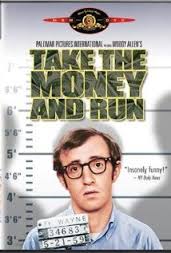
TAKE THE MONEY AND RUN
US, 1969, 85 minutes, Colour.
Woody Allen, Janet Margolin, Marcel Hillaire.
Directed by Woody Allen.
Take The Money And Run is the first of the films that Woody Allen directed and through which made a great reputation for himself in the 70s. It is a small film but a very successful use of robbery conventions for parody and satire purposes. Woody Allen emerged during the 70s as one of America's greatest comedians with such films as Bananas, Sleeper, Love and Death, Annie Hall. Up to this film he had written some stage plays, especially Play It Again Sam. He had also written What's New Pussycat, What's Up Tiger Lily. He was the main James Bond figure in the spoof Casino Royale. This film is a variation on the little man hero (the little man villain) and the film makes funny comment on the American way of life, ambitions, gently satirising documentaries, experts, robberies. A good laugh clears the air and if there is a lot wrong with the American there are healthy signs of self criticism and the ability to laugh at oneself.
1. The success of Woody Allen?
2. The characteristics of his humour and personality? The little man, bald and with glasses, his reacting to people, his being forgotten? His insight into life and situations? His shyness? The incongruities of his verbal humour? Firmly American. his comment on the American way of life? The quality of his visual and verbal humour?
3. The title and its focus on robbery? Its parody of gangster biography films? Its parody of the interviews and documentaries? The parody of prison films. of the chain gangs and their escape ? The parody of the American romance? The parody of the film robberies? How well conceived and executed were these parodies? How much did they contribute to the enjoyment of the film?
4. The skill of the screenplay. for example, the opening descriptions of Virgil's way of life. the file on Virgil? The development of his character? The chorus of the interview with his parents? With doctors. the warden. admirers etc.? What kind of character emerged from this? The poor American boy, in the atmosphere of all America. his cello playing etc.? The implied inevitability of becoming a gangster?
5. The humour in the visualising of the robberies? The snatch. the handbag with the toys, the discussion about the spelling of 'gun'. the robbery of the pet shop? The final robbery where the two gangs arrive at the one time?
6. How genuine and feeling was the romance with Louise? Her character and sweetness. her stammer, her being given lines like Woody Allen's? Her visiting Him in prison. being on the run, the child?
7. The most memorable gags and jokes?
8. The visualizing of the escape with the soap gun and its raining, the various attempts to murder Miss Blair etc.?
9. What is the value of parody and satire. for laughter and insight? The comedy of human foibles?
Published in Movie Reviews
Published in
Movie Reviews
Tagged under
Saturday, 18 September 2021 19:23
10
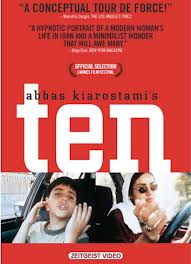
10
Iran, 2002, 92 minutes, Colour.
Directed by Abbas Kierostami
For those who like the film, there is little more that can be said except that it is by master-director, Abbas Kierostami. For those who found it an ordeal to sit through, it seemed to be more radio drama than cinema. The emphasis was on dialogue. While there were continuous shots of the speakers (although many were in the dark), it was the talk that was important. The style of shooting and editing is said by some to be revolutionary. On the other hand, the film resembled a student assessment project. While some of the points made about Iran, especially family, growing consumerism and the assertion of women for a stronger place in society, it was a rather gruelling experience.
1. The work of Kierostami and his reputation world-wide? His film style, minimal cinema? The content of his films and insight into Iranian society and culture?
2. The technical aspects of the film, digital cameras, two fixes cameras, editing? The improvisation of the acting and recording the conversations? Editing and pace?
3. The film as radio film with the focus on the discussions and arguments of the main characters?
4. The film in a car, the focus on the driving, on the drivers? The positioning of the cameras? The passing world glimpsed outside the windows? Communication between persons in a car?
5. The ten pieces, the skill, the timing, the content?
6. The driver and the focus on her, her relationship with her husband, son? Themes of family, divorces and splits and custody in Iran?
7. Themes of women, their status, relationship with men, the patriarchy? Subservience, marriage? The issue of the veil and the young woman taking off her veil in the car?
8. The religious background of Iran, Islam and its traditions, the beginnings of discussion about prayer and faith?
9. The driver, her life, her son, her being hurt, leaving her husband, the clashes with him, seeing him across the street in the vehicle? Arguing with her son? Talking rather than listening?
10. The boy, spoilt, the broken family, his angers, wanting to see his grandmother, arguing with his mother?
11. The relation given the driver, her discussions about the welfare of the boy?
12. The prostitute and the long discussion about her work, analysis of sexuality, relationships?
13. The woman who left her boyfriend, the two drives in the car, her discussions about prayer, her attitude towards men, her shaving her head, the removing of the veil?
14. What was achieved by the discussions of these characters? Insight into Iran? The dramatic impact (or not) on the audience?
Published in Movie Reviews
Published in
Movie Reviews
Tagged under
Saturday, 18 September 2021 19:23
Take Me to Town
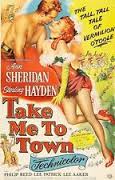
TAKE ME TO TOWN
US, 1953, 80 Minutes, Colour.
Ann Sheridan, Sterling Hayden, Phillip Reed, Lee Patrick.
Directed by Douglas Sirk.
Take Me to Town is an attractive Western directed by Douglas Sirk before he launched into his series of soap operas like Magnificent Obsession, Imitation of Life... Ann Sheridan, ageing a little, is a tough but attractive heroine. Sterling Hayden is a sturdy hero. There are religious overtones to the film and it is a curious blend of the West and the religious picture. It is brief, probably cliche, but enjoyable.
1. An enjoyable comedy Western? A blending of the traditions of Western films and religious films? The film as a 'B' film of the 50s, colour, locations?
2. The work of Douglas Sirk as a romantic director? How well did the film combine the conventions of the saloon Western and the Western of the simple family life? How well did they mesh? 3. The atmosphere of the opening, the story about Vermillion? The train, the escape?
4. The transition to the saloon and the advertisement for Vermillion? Rosy as a character and the saloon? Ed as the Marshall and his pursuit of Vermillion and his succumbing to the charms of Rosy? The transition to the atmosphere of the town, the protests against Vermillion, the ordinary way of life, the ladies and their chatter, the shops, the religious atmosphere? A typical American town with its Protestant religious flavour? The significance of the song at beginning and end?
5. The story of Vermillion? The initial impact of the character of Vermillion, her escape? Her wise cracking style, her dances? The encounter with the boys and her handling of the situation? The expediency of her escape and going with the boys? Changing with the cooking of the meal, the humour of the swimming, the shooting of the bear? Her response to Will? The challenge to her and her deciding to stay? What change happened in her? Men and the women that they expect and their transformation by will?
6. The portrayal of the boys ? typically American, types? Their styles, eg. the boy and his mussed hair, the little one saying 'I like it' or 'I don't like it' etc.? Their place in the town, relationship with their father, memory of their mother, searching out of Vermillion, bringing her home, the swimming sequence, the bear? The love that grew from these encounters?
7. Will Hall as the strong American type, love for his boys, his work, the fight? His transformation into the Minister? His fighting the challenges to Vermillion and then his sermon? Values and the building of the church? How did he transform Vermillion, be transformed by her?
8. Vermillion accepted by the ladies although Mrs. Sloper and her resentment? Cole and his pursuit? The build-up to the concert and her arranging everything? The humour of the roses, the song 'Take Me to Town' etc.? Rosy and her arrival? Ed and his presence?
9. How well was the final crisis contrived ? the concert, Ed and his arrival, Cole, will? The climbing of the cliffs? The shots in the play and in reality? Forgiveness?
10. A pleasant piece of Americana of the 19th century and the American heritage? The final words of the song?
Published in Movie Reviews
Published in
Movie Reviews
Tagged under
Saturday, 18 September 2021 19:23
Take Me Out to the Ball Game
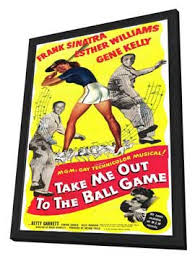
TAKE ME OUT TO THE BALL GAME
US, 1949, 93 minutes, Colour.
Gene Kelly, Frank Sinatra, Esther Williams, Betty Garrett, Jules Munshin, Edward Arnold.
Directed by Busby Berkeley
Take Me Out To The Ball Game is a pleasant, but very minor, Arthur Freed production. Freed, writer of many songs, was an excellent producer of M.G.M. musicals in the '40s and '50s ? including On The Town, An American In Paris, Singin' In The Rain.
Song and comedy writers Betty Comden, Adolph Green and Roger Edens contribute a minor musical score. Choreographer Busby Berkeley directs the film, without much echo of his razzle dazzle visual style in the '30s. The story and the choreography is by the team of Stanley Donen and Gene Kelly, who were soon to use many of the stars of this film for their classic musical On The Town and were then to make Singin' In The Rain and It's Always Fair Weather. Kelly continued his dancing reputation and moved to film directing in the '60s and '70s; Donen directed such musicals as Funny Face, The Pyjama Game, Damn Yankees.
The stars seem to enjoy themselves and actually make jokes about their singing and dancing rivals in the final song. Gene Kelly doesn't have much dancing in comparison with his other films and portrays the conventional wolf. Jokes
are made about Frank Sinatra's weight and his ingenuousness. Stage star Jules Munshin joins the two and was to be the third sailor in On The Town. Esther Williams has a chance to swim, Betty Garrett has a very enjoyable raucous song singing at Frank Sinatra and Edward Arnold does another variation on his swindling villainous heavy. The film is particularly patriotic in its songs and its focus on baseball in the Teddy Roosevelt period. Entertaining but mild in comparison with other M.G.M. musicals and vehicles for these stars.
Published in Movie Reviews
Published in
Movie Reviews
Tagged under
Saturday, 18 September 2021 19:23
Turn Back the Clock
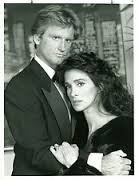
TURN BACK THE CLOCK
US, 1989, 90 minutes, Colour.
Connie Sellecca, David Dukes, Gene Barry, Dina Merrill.
Directed by Larry Elikann.
Turn Back the Clock is an entertaining fantasy thriller. It is a remake of the 1947 movie, Repeat Performance (with Louis Hayward and Joan Leslie, who has a momentary special guest appearance in this film).
The film is a star vehicle for televisions Connie Selecca. She portrays a women who kills her husband in a struggle on New Year's Eve and makes a wish that she could have the time over again. This immediately happens. She knows what happened during the past year, tries her best to steer things to better resolution - but despite her efforts, everything happens as before.
The film is done in the slick television style, entertaining in its plot as well as in following through the themes and exploring the characters.
1. Entertaining thriller? Mystery? Fantasy? Story of crime? The New York and Californian settings? The world of movie affluence? The use of colour for the action and faded colour with suggestions for the original year? The musical score?
2. The title, the title of the original movie? Indication of themes?
3. The opening, the struggle, Sheila and her husband's death? New Year? Her seeking out William? The party? Her relationship with Jack and trying to get him to help her?
4. Sheila as a character, strong, her media background, success in films? Relationship with her husband? Her going back into the past knowing what was to happen? Her efforts to change the past? Her love for her husband, trying to protect him, letting him work with the Mini-Series? His infidelities, going to California, her not realising the truth, discovering it? The clash with Tracey? Trying to get William to write the screenplay, protect him from Maureen Dowd? His being put in the institution? Her growing frustration and grief? The nearness to herself and Barney? Barney's accident, hospital? His arrival, struggle and William intervening to change the future? Her New Years Eve? Her trying to contrive the distance between herself and Barney, Barney's accident, hospital? His arrival just before midnight? The struggle and William intervening to change the future? Her strong character?
5. Barney, the successful Hollywood director, man about town? relationship with his wife and their successes? His roving eye? The party, the attraction to Tracey, meeting her again, giving her the novel to write the screenplay? Her turning against him after using him? Relationship with Michael? Barney and his anger, the violence? The hospital, moving him? Coming back to the apartment, the struggle with Sheila, William killing him, a burnt out case?
6. William, friendship with Sheila, his success as a poet, his failures? Relationship with his wife and their successes? The opportunity to write the screenplay? The meeting with Maureen Dowd, living with her, her using him? Coming to California with her? The growing clashes? Her anger and putting him in an institution? Sheila's warnings? Her visit to him and his reaction? His emergence and saving Sheila?
7. Maureen Dowd, widow end wealth, using people, anger, vengeance on William?
8. Jack, the producer, his friendship with Sheila, trying to arrange deals, the bargains, the mini-series? His concern about her, his attempts to protect her?
9. Tracey as an ambitious writer, coming to the wrong party, the relationship with Barney, in California, her seduction of Barney, writing the screenplay? Her clashes with Sheila? Her relationship with Michael, dumping Barney and going to England?
10. Glossy situations, glossy characters, but entertainingly presented?
Published in Movie Reviews
Published in
Movie Reviews
Tagged under
Saturday, 18 September 2021 19:23
Truly, Madly, Deeply
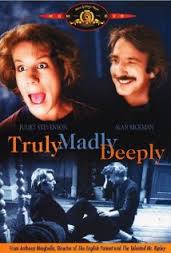
TRULY, MADLY, DEEPLY
UK, 1990, 102 minutes, Colour.
Juliet Stevenson, Alan Rickman, Michael Maloney, Bill Paterson.
Directed by Anthony Minghella.
Truly, Madly, Deeply is a very popular and attractive British comedy drama. There is a tour de force performance by Juliet Stevenson as Nina, a middle-aged woman whose love has died and who clutches at his memory, even making him present as a ghost in her life. She must come to terms with his death, the experience of bereavement, letting go of the past and facing a new life. Alan Rickman (Die Hard, January Man, Quigley, Robin Hood, Prince of Thieves) is very good as Jamie, the dead lover, the ghost. Michael Maloney appears as a different kind of psychiatrist who holds the key to Nina's future.
The film is a BBC film production, written and directed by Anthony Minghella, who has written and directed extensively for television, and directed Juliet Stevenson and Michael Maloney in these productions. The film has not only strong performances and a fine screenplay, it has wit, sympathy and many touches of wry humour.
Minghella went on to win the Oscar for The English Patient and to direct The Talented Mr Ripley and Cold Mountain.
1. The popularity of the film? In Britain, the United States and overseas? Humane, a portrait of love, the experience of bereavement? A down to earth ghost story?
2. The skills of the writer/director, the performances? The BBC background?
3. The London locations, the streets, houses, office places? Bristol locations? The city, the gardens? Authentic atmosphere?
4. The musical score, the cello performances? The popular songs? The poetry?
5. The title, Nina and Jamie's game about the quality of their love and its value?
6. The background of the ghost story: ghosts as symbols, the experience of Nina and Jamie, her Animus? Psychological interpretations? The experience of the return and the closeness of the loved one? Living and reliving the past? Clutching to love? Not wanting to let go ? grief and tears? The possibility of a life and a new life? Rediscovering and remembering and then being able to let go?
7. The comments on the experience of death: Jamie and his comment about looking from the other side of a glass wall and watching? Exploration of things of the afterlife, God, heaven and hell? The experience of illness, separation, the effect of death?
8. Themes of grief, love and tenderness, shock? The reaction of anger? Depression? Not letting go? Nina and her sessions with her psychiatrist? The voice over? Questioning about the ghosts, the psychiatrist eliciting Nina's responses? Her talking about ghosts and their being ridiculous? Her saying that she was OK, yet her weeping and her anger? The puzzle about Jamie's return and its repercussions for her?
9. Nina, her appearance, age and experience? As a personality? The summary of her life in her hopping biography? Her concern for him as for everything in her life? The meaning of that relationship? Her love for her own flat, it being run down, renewed? The mess? The appearances and disappearances of the rats? Terrifying her? The men coming to fix the flat ? and their admiration for her, love for her? Nina as a lovable woman? Nina at work, her friendship with Sandy, the postcards from his son and her translating? Titus the Pole and his desperation, visiting her, wanting a relationship bridging her the air ticket? George the widower and sharing the experience of the ghosts and talking to dead loved ones? The plumber? Her being loved by people, especially Moira? Mark?
10. Nina at work, the translation, her skill with Spanish? Walking the streets and having conversations with Moira? Sharing with Moira, her pregnancy, the cup of coffee ? and the racial tensions? The invitation to the birth, the effect of the birth on Nina and her wanting her own children? Nina at home, the repairs? Her love of music, the piano, singing? Her knick knacks and her wanting them in the right place? Living alone?
11. Audience anticipation of Jamie and his appearances? The realism of the film making ? no ghostly effects? Hearing him, his playing? Nina's joy in his reappearance? His cold and the chill? Nina and her joy, chatting, all the questions? Sharing, the games, talking about the clouds and their resemblances, truly, madly, deeply? Dancing? The week going by quickly? Jamie waking her up, sending her off to work? Her transformation ? and Sandy's comments about the contrast? The people coming to the door, Jamie’s playing the game with the ghost sheet? The exhilarating experience of Jamie's return after her simply having a sense of him and hearing him?
12. Jamie as ordinary, even banal? Response to questions about death? Playing the cello? Talking Spanish, the games, singing? Sharing and remembering? The reminiscence about the first night?
13. The irony of the ghosts all turning up, Jamie's friends, only men? Their watching the videos, brief encounter and reciting the lines? Deciding to watch Five Easy Pieces or Fitzcaraldo? Nina bringing home Pinocchio and To Forget Venice? The variety of types, their presence in the house, in the lounge room, in the bedroom? The effect on Nina? Rolling up the carpet, wanting to transform the floors? Her exasperation, and their recognising it was time to leave? Their finally watching Nina and Mark out the window, a farewell?
14. Sandy, Scotsman, work in languages, the office? Talking with Nina, translating the postcards, the separation from his wife, his son?
15. The various types at the office, language, translations? The French man, and the interview with Sandy? Titus and his loneliness, memories of Poland, singing. food? Knocking on Nina's door? The relationship with Moira, father of her child?
16. The men repairing the house, George, the older man? The comment about the rats? Their disappearance and return? His talking to his wife?
17. Moira, her Chilean background, the film maker, the pregnancy, the experience of the restaurant and the humiliation? The fight? Her giving birth and the joy of the child?
18. Nina's sister, pregnant, tidy, concerned about her sister? Sympathetic? Harry and his love for his aunt? The question about the gift of the cello, Nina's reaction about insensitivity? The later visit and their not opening the door? Her husband and his literally climbing everything, wanting to climb Everest? The final decision with Nina giving the cello away?
19. Her wanting some kind of independence, her own life style? Jamie and his tendency to tidy everything? Put on the heaters? Take over? Her final reaction of exasperation against?
20. The encounter with Mark, his performance at the restaurant? Assisting? His reaction towards racism? The promise of an encounter with Nina? Going to the bus and her having to delay the date? Her crying? Seeing Mark with the children, the Downs Syndrome children and their reactions? The enjoyment of her hopping and her giving her biography? His hopping and giving his own story? The device of communicating a great deal about Mark quickly? The night together? Sharing? The possibility of a new life? Her going ahead with Mark?
21. Jamie, the farewell, the ghosts and their goodbye?
Published in Movie Reviews
Published in
Movie Reviews
Tagged under